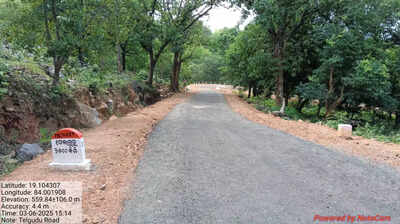ARTICLE AD BOX

Koraput: For years, people of Telgudu, a remote tribal village of just over a hundred residents tucked away in the hilly interiors in Rayagada district’s Gunupur block remained cut off from the outside world.
The only earthen path leading to the village would become a slippery, dangerous trail during the monsoon, leaving the community disconnected from schools, hospitals, and markets.“During the monsoon, we couldn’t even step out of the village. If someone fell sick, it took hours to reach the health centre at Puttasingh. Many times, our crops were spoilt because we couldn’t take them to the market in time,” said Simanta Sabar, a villager.However, all that started to change when the Pradhan Mantri Janjati Adivasi Nyaya Maha Abhiyan (PM-JANMAN) identified Telgudu as a priority village in 2024 for all-weather road connectivity.“The project, connecting Tarbel to Telgudu began in Dec 2024 and was completed by May 30, 2025. The 2.5-km stretch, running through the hilly terrain of Gunupur block, is being built using environmentally sustainable methods that connects the village to the PWD road at Puttasing enroute Tarbel,” said junior engineer of rural works (RW) division, Gunupur, Himanshu Maharana.
During the road construction, a significant portion of the workforce was drawn from the local community, said sub-divisional officer Chittaranjan Panda. “We ensured that the people of Telgudu were not merely recipients of the projects benefits but active participants, fostering a sense of ownership and connection,” Panda said.Executive engineer of RW division, Gunupur, Gajendra Pradhani, said the project encountered several hurdles, ranging from the difficulty of transporting materials in the absence of a proper route to building confidence among the villagers.
To overcome these challenges, temporary access roads were laid, and regular meetings were organised to keep residents updated on the progress. Today, the positive impact of those efforts is clearly visible.Now the village children can reach secondary schools at Sagada and Puttasing safely even during the rains, said Lakia Sabara, another villager.The local ASHA worker shared that emergency medical access has improved dramatically and ambulances now reach the village in just 20 minutes, a journey that earlier took hours.The road has also brought economic and social changes. Farmers can now transport their produce to the Puttasing mandi with ease, earning up to 30 per cent more due to reduced spoilage and better prices. Women self-help groups have become more active, selling their handicrafts in nearby towns and attending district-level training sessions.“This road is not just a path of concrete but of hope. For us, it means education, healthcare, and opportunity,” said Basanti Sabar, a member of the village development committee.

 3 hours ago
4
3 hours ago
4









 English (US) ·
English (US) ·